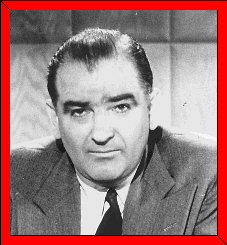 It took me forever to do it, but I finally saw “Good Night, and Good Luck” a few days ago. This review concludes by stating that the film, “accurately depicts an important episode in American history, and it deserves a far wider audience than it is likely to get.”
It took me forever to do it, but I finally saw “Good Night, and Good Luck” a few days ago. This review concludes by stating that the film, “accurately depicts an important episode in American history, and it deserves a far wider audience than it is likely to get.”I don’t know what the earnings numbers are on the film, but I suspect that that’s true.
I thought it was a mesmerizing account of the events leading up to the “See It Now” broadcast on Sen. Joseph McCarthy in 1954. As vividly recreated in the movie, Edward R. Murrow allowed McCarthy’s own words and pictures to make the case. When McCarthy responded a few weeks later, he engaged in typical demagoguery and character assassination against Murrow and others whom he felt aided the communist cause (as I watched the movie, I felt you could insert the word “terrorist” for “communist” and you would just about be making a documentary on the last five years of this country).
Murrow responded point-by-point to McCarthy’s accusations, saying that the charge that Murrow was a member of the IWWW, a Communist Party organization which McCarthy also referred to as a “terrorist” organization (thanks to the Rotten Tomatoes blog for jogging my memory on that one), was false. McCarthy also charged that Murrow wrote a book dedication for a British scientist who was an alleged Communist sympathizer, and Murrow said that that was true; the man respected Murrow for his legendary reporting during the bombing of London in World War II.
I also thought it was interesting that, according to the movie, William Buckley wanted to make a rebuttal on behalf of McCarthy, but William Paley, the head of the CBS television network, said no. Also, when Paley sat Murrow and producer Fred Friendly down in Paley’s office to tell them at first not to go ahead with the program on McCarthy, Paley tells them, “you should teach journalism,” and Friendly did later on at Columbia University.
I think it should be noted that, though the showdown with McCarthy was a pioneering moment for T.V. news journalism, it was a costly one. The Alcoa company pulled its advertising from the network as a result of this story and that of Air Force Reserve lieutenant Milo Radulovich which led up to the McCarthy program. Subsequent to that, there were layoffs in CBS’s news division, as portrayed in the movie in a scene where Jeff Daniels, playing a CBS executive, breaks the news to Joe and Shirley Wershba, played by Robert Downey, Jr. and Patricia Clarkson (the Wershbas were advisors on the film and no doubt provided many character details; they are featured prominently – by the way, it’s good to see that Robert Downey, Jr. has straightened himself out to the point where he can handle these types of roles again). Also, Paley moved “See It Now” from prime time to Sunday afternoons, eventually leading to the show’s cancellation four years later.
Another casualty of the McCarthy episode was journalist Don Hollenbeck, portrayed in the movie by Ray Wise, who appeared in the T.V. series “Twin Peaks” (man, that was an odd one) as Laura Palmer’s father who was “possessed by the spirit of ‘Bob’” (you don’t want to know), and he also portrayed a member of criminal Clarence Boddicker’s gang in the original “RoboCop.”
The opening and closing moments of “Good Night, And Good Luck” have to do with Murrow’s speech to the Radio-Television News Directors Association and Foundation on October 15, 1958. The entire speech is challenging and cautionary for the present day as well, but I thought these passages were particularly interesting:
Heywood Broun once said, "No body politic is healthy until it begins to itch." I would like television to produce some itching pills rather than this endless outpouring of tranquilizers.And…
I began by saying that our history will be what we make it. If we go on as we are, then history will take its revenge, and retribution will not limp in catching up with us.Murrow of course was primarily talking about television, but I think was he said could be applied to all electronic and online media also.
We are to a large extent an imitative society. If one or two or three corporations would undertake to devote just a small traction of their advertising appropriation along the lines that I have suggested, the procedure would grow by contagion; the economic burden would be bearable, and there might ensue a most exciting adventure--exposure to ideas and the bringing of reality into the homes of the nation.
To those who say people wouldn't look; they wouldn't be interested; they're too complacent, indifferent and insulated, I can only reply: There is, in one reporter's opinion, considerable evidence against that contention. But even if they are right, what have they got to lose? Because if they are right, and this instrument is good for nothing but to entertain, amuse and insulate, then the tube is flickering now and we will soon see that the whole struggle is lost.
He and others of his day blazed the trail. It is up to us to follow, frequently re-fighting old battles as well as new ones, but follow we must if we are to honor their legacy.
No comments:
Post a Comment